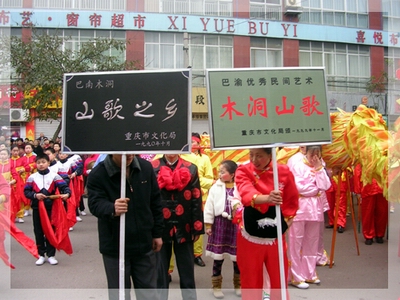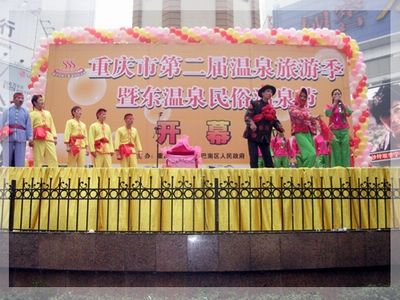| Work hard on saving the diminishing cultural heritage! In Oct 1990, Mudong County was named “Town of Folk Songs” by Cultural Bureau of Chongqing City. In Nov of 1999, Mudong folk songs were authorized as the excellent Bayu folk art. On Jun 9, 2006, it was successfully applied to be the national intangible culture heritage. Banan District government pays great attention on collecting, saving and protecting Mudong folk songs. With the guidance of local cultural bureau, the government organizes meeting to study the development of Mudong folk songs and carries out relevant policies to protect it. The leaders of Mudong County integrate the work on developing Mudong folk songs into their agenda, and guaranteed by all means the inputs of human, material and financial resources. The local schools cooperate with government’s work. For example, Mudong Primary School teaches students how to sing folk songs in music course, such as “Crab Song”, “Cutting Grass Song”, “Cutting Firewood Song”, and etc. The students take the roles in singing while acting, which develops their intelligence and arouse their interests. The opera “The Diverse Extracurricular Activities” ranked second in the city performance competition. More than 300 students become little folk singers, who are the heirs of this folk art. Beside traditional Mudong folk songs, many new songs are created by folk artists, such as “The Hometown of Mudong Folk Songs”, “The Great Change of Our Hometown”, “Harvest Song”, “Mudong Love Songs”, “Protecting Forest Songs” and etc. Mudong Folk Songs have become a brand of Bayu folk culture. In order to make it popular, the tunes and lyrics of Mudong Folk Songs are broadcasted on television and published on books, such as “Chinese Folk Arts”, “Chinese Folk Lyrics-Chongqing Edition”, “Chinese Folk Lyrics-Baxian, Chongqing Edition”. The Mudong folk song-“Working hard with Strong Will ” created by Bai Bing-cheng, has won prizes for more than ten times in city and provincial competition. In 1987, four Mudong folks songs were filmed in the international cultural exchange documentary “Voice in Chinese West”. At the beginning of 1990’s, the folk song “Two Sets of Parents In-laws Go to City” created by Bai Bing-cheng, won the second prize in creation and acting in Chongqing dramatic performance. In May of 1992, Mudong folk songs got applause in Wangcong International Concert held in Chengdu City. In Nov of 1997, Mudong folk songs were showed in Art Square in Banan District. From Jan 1st to 3 rd of 2001, Mudong folk singers participated in Chongqing Folk Art Festival. On Jan, 20004, the Mudong folks song “The Distinctive Culture Is Treasture” won the second prize in Banan District Performance. Not only in mainland, have the Mudong folks songs had great influence in Taiwan and abroad. At the beginning of 1990s, Mr Xu Hui-chang, the professor of Taiwan Art University led a team to do research on this folk art and filmed two competitions of Mudong songs to do comparison with Taiwan Gaoshan folk songs. Also in 1990, the “Chuangjiang Haozi” and “Gaoqiang Helai” singed by Mudong folk artists draw great attention of international folk art experts. Mr Jiateng Qiandai, who was the consultant of UNESCO, the international folk art expert, and the professor of Japan Guangdao University thought highly of this art. On Mar 29, 2004, the professor went to Chongqing to search material about Mudong folks songs with accompany of her student – Miss Wangqian. In Oct and Nov of 2004, the documentary “Searching for Mudong Folk Songs” and “The Hope of Mudong Folk Songs” were broadcasted in two programs on Chongqing TV Station. On Sep 6, 2005, “Bannan Government Saves Mudong Folk Songs” was reported on Chongqing Daily. In the evening of Sep 16, the Mudong Folks Songs Performance was broadcasted on Chongqing Cable TV Station. On Dec 27, 2005, Chongqing Morning and Chongqing Evening reported the folk song “Meeting the Bride”. On Jan 1, 2006, the history of Mudong Folk Songs was recorded on Jiajinghua Newspaper in Canada. In Feb of 2006, the folk song “The Immigrant-Ms. Jin Dahua” was acted in national program as the representative of Chongqing City. On Jun 3, 2006, this art was successfully applied to be the national intangible culture heritage. In this month, Mudong folk songs were acted for two days to celebrate the first “Intangible Cultural Heritage Day”. The above events show the bright future of Mudong folk songs. As Chinese descendents, we should try our best to carry down and develop our national folk art. |
|
 |
|
 |
|
 |
|
 |
|
